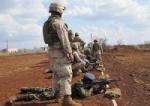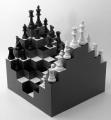Exemplar scenarios
Blow up
Radio message/context ‘‘You and your partner are responding to a call describing a disturbance outside of a school. A boy sitting on the grass directly in front of you has been acting suspiciously.’’
Scenario description The participant arrives on scene with another officer. The fellow officer escorts students away from the suspect and asks the participant to take care of the suspect. As the participant approaches the suspect, the boy gets up and becomes verbally aggressive. The boy is wearing an untucked, partially buttoned shirt. A wire can be seen hanging down under the shirt.
The boy opens his shirt to expose an improvised explosive device around his waist. A school bus approaches in the background. The boy removes the actuator from his waistline and holds it in his hand. He then gets flustered and drops the actuator on the ground. He bends down to pick it back up and then detonates the device just as the school bus pulls up next to him.
The time between the
turning point (denoted in italics in the scenario description) and the end of the trial (i.e., if participant did not shoot) was 13.51 s.
Convenience store
Radio message/context ‘‘While on patrol, you stop at the neighborhood convenience store for a cup of coffee. You are getting out of your car and going into the store.
Scenario description The participant enters the store. The store manager greets him and nervously invites him to stay and have a cup of coffee. The camera pans to allow the participant to looking around the store (and away from the store manager).
While looking around, the sound of a round being chambered into a firearm can be heard. The camera pans back around to show the perpetrator holding the store manager hostage. After a few seconds, the perpetrator surrenders, puts his weapon down, and releases the store manager. Immediately afterwards, the perpetrator then draws a backup weapon and shoots in the direction of the participant.
The time between the
turning point and the end of the trial was 5.46 s.
School hostage
Radio message/context ‘‘You and your partner are responding to a call describing a possible hostage situation at a school. You are in the passenger seat and your partner is driving to the scene.’’
Scenario description The officers drive into the school’s service (i.e., back) entrance.
After entering this area, just as they stop and begin to get out of the car vehicle, a male suspect armed with an assault rifle becomes visible, close to the rear entrance to the school. The male immediately turns to run back into the school and appears surprised to see the police. The suspect opens the rear door and enters the school with the assault rifle.
The time between the
turning point and the end of the trial was 6.07 s.












Bookmarks